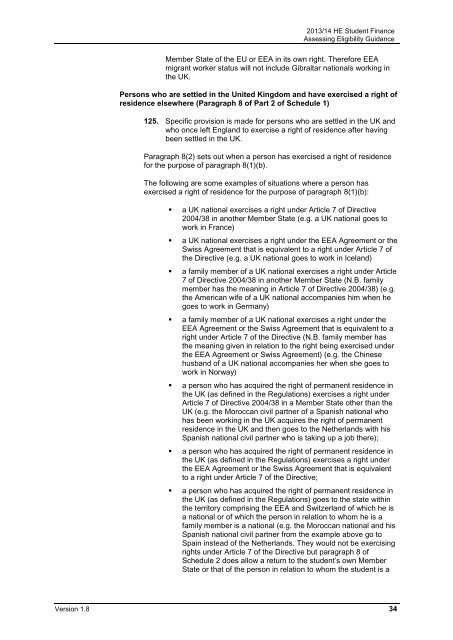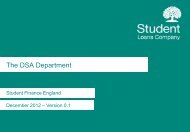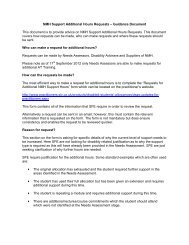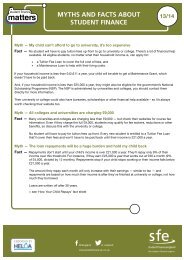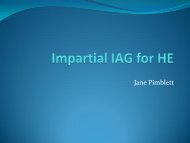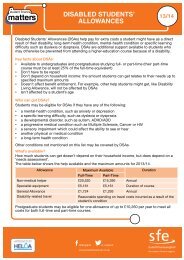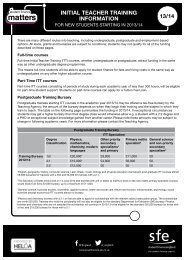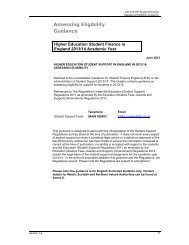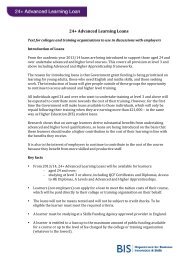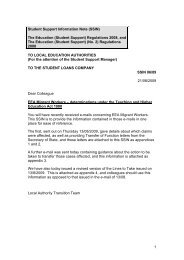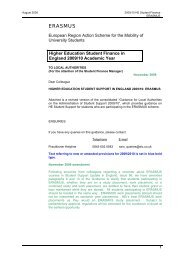SFE Assessing Eligibility Guidance 2013/14 - Practitioners - Student ...
SFE Assessing Eligibility Guidance 2013/14 - Practitioners - Student ...
SFE Assessing Eligibility Guidance 2013/14 - Practitioners - Student ...
You also want an ePaper? Increase the reach of your titles
YUMPU automatically turns print PDFs into web optimized ePapers that Google loves.
<strong>2013</strong>/<strong>14</strong> HE <strong>Student</strong> Finance<br />
<strong>Assessing</strong> <strong>Eligibility</strong> <strong>Guidance</strong><br />
Member State of the EU or EEA in its own right. Therefore EEA<br />
migrant worker status will not include Gibraltar nationals working in<br />
the UK.<br />
Persons who are settled in the United Kingdom and have exercised a right of<br />
residence elsewhere (Paragraph 8 of Part 2 of Schedule 1)<br />
125. Specific provision is made for persons who are settled in the UK and<br />
who once left England to exercise a right of residence after having<br />
been settled in the UK.<br />
Paragraph 8(2) sets out when a person has exercised a right of residence<br />
for the purpose of paragraph 8(1)(b).<br />
The following are some examples of situations where a person has<br />
exercised a right of residence for the purpose of paragraph 8(1)(b):<br />
• a UK national exercises a right under Article 7 of Directive<br />
2004/38 in another Member State (e.g. a UK national goes to<br />
work in France)<br />
• a UK national exercises a right under the EEA Agreement or the<br />
Swiss Agreement that is equivalent to a right under Article 7 of<br />
the Directive (e.g. a UK national goes to work in Iceland)<br />
• a family member of a UK national exercises a right under Article<br />
7 of Directive 2004/38 in another Member State (N.B. family<br />
member has the meaning in Article 7 of Directive 2004/38) (e.g.<br />
the American wife of a UK national accompanies him when he<br />
goes to work in Germany)<br />
• a family member of a UK national exercises a right under the<br />
EEA Agreement or the Swiss Agreement that is equivalent to a<br />
right under Article 7 of the Directive (N.B. family member has<br />
the meaning given in relation to the right being exercised under<br />
the EEA Agreement or Swiss Agreement) (e.g. the Chinese<br />
husband of a UK national accompanies her when she goes to<br />
work in Norway)<br />
• a person who has acquired the right of permanent residence in<br />
the UK (as defined in the Regulations) exercises a right under<br />
Article 7 of Directive 2004/38 in a Member State other than the<br />
UK (e.g. the Moroccan civil partner of a Spanish national who<br />
has been working in the UK acquires the right of permanent<br />
residence in the UK and then goes to the Netherlands with his<br />
Spanish national civil partner who is taking up a job there);<br />
• a person who has acquired the right of permanent residence in<br />
the UK (as defined in the Regulations) exercises a right under<br />
the EEA Agreement or the Swiss Agreement that is equivalent<br />
to a right under Article 7 of the Directive;<br />
• a person who has acquired the right of permanent residence in<br />
the UK (as defined in the Regulations) goes to the state within<br />
the territory comprising the EEA and Switzerland of which he is<br />
a national or of which the person in relation to whom he is a<br />
family member is a national (e.g. the Moroccan national and his<br />
Spanish national civil partner from the example above go to<br />
Spain instead of the Netherlands. They would not be exercising<br />
rights under Article 7 of the Directive but paragraph 8 of<br />
Schedule 2 does allow a return to the student‟s own Member<br />
State or that of the person in relation to whom the student is a<br />
Version 1.8 34


